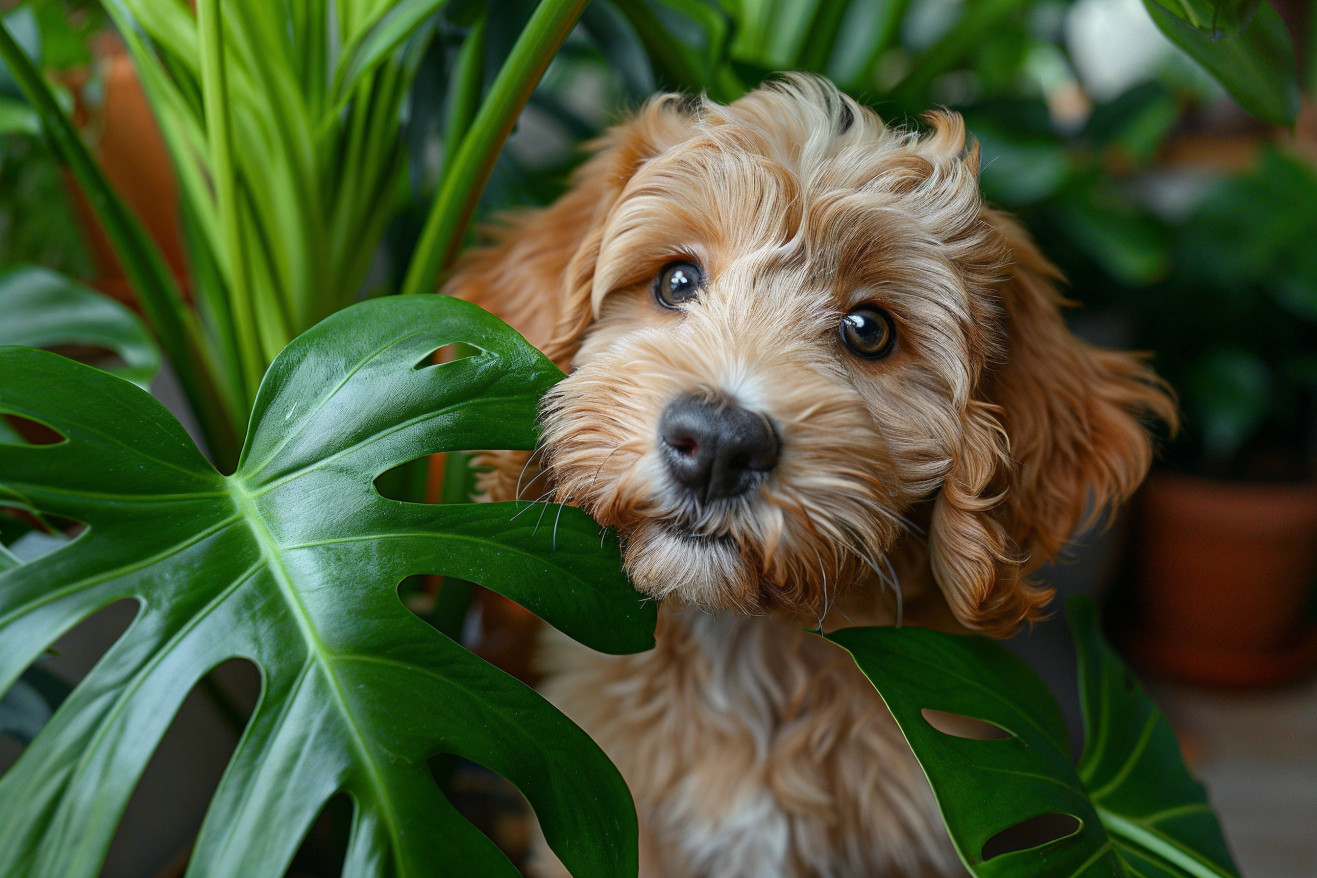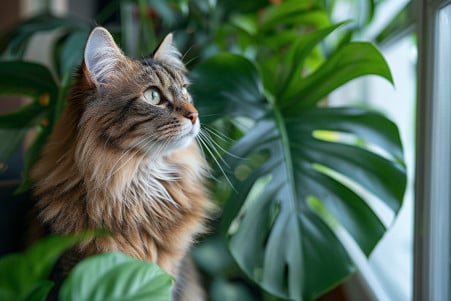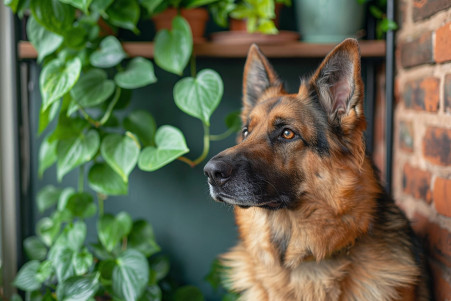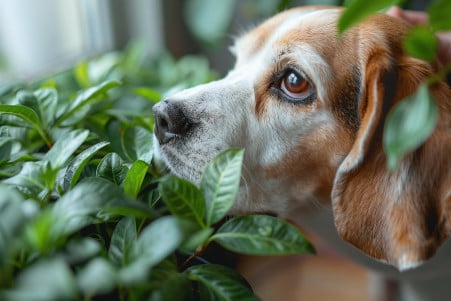Do Monsteras Hurt Dogs? A Look at Plant Toxicity
10 April 2024 • Updated 9 April 2024

One of the most common questions among dog owners is whether or not the popular monstera plant is safe for their furry friends. Monstera deliciosa, also known as the Swiss cheese plant, is poisonous to dogs if they consume it. This is because the plant contains insoluble calcium oxalate crystals, which can lead to oral irritation, excessive drooling, vomiting, and difficulty swallowing in dogs. In some cases, dogs may also experience swelling of the lips, tongue, oral cavity, and upper airway.
This article will take a deep dive into the research to better understand the toxicity of this plant. This includes looking at studies that have been done on the compounds in monstera plants and how they impact the digestive and respiratory systems of dogs. It will also include expert perspectives from veterinarians and horticulturalists on how to handle and protect against the plant's toxicity. Ultimately, this article will help dog owners understand the risks and benefits of bringing a monstera into their home and how to keep their dog safe in the process.
Are Monsteras toxic to dogs?
What Makes Monstera Plants Toxic?
The toxicity of monstera plants is primarily due to the presence of insoluble calcium oxalate crystals, according to Monster Plant Resource's citation. These crystals are shaped like needles and can be found throughout the plant, including the stems, leaves, roots, and unripe fruit. If a dog chews on or eats any part of the plant, these crystals can cause irritation and damage to the mouth, throat, and gastrointestinal tract.
As explained in a PMC article, the oxalate crystals are raphides, which are needle-shaped crystals with sharp edges that can be embedded in tissues. Raphides can also cause the release of histamine, which can cause an inflammatory response. The toxicity of the plant can depend on the concentration of these oxalate crystals in the different parts of the monstera plant.
Interestingly, while the rest of the plant is toxic, the ripe fruit of the monstera is nontoxic and safe to eat, according to Monster Plant Resource. That said, the unripe fruit can still cause the same irritation as the rest of the plant. It's important to make sure dogs are kept away from all parts of the monstera plant except for the ripe fruit to avoid potential poisoning. Now that we know what makes the plant toxic, let's move on to what to do if your dog ingests it.
First Aid and Emergency Treatment of Monstera Poisoning
If your dog eats a monstera plant, it’s important to act quickly to reduce the danger of the situation. First aid measures include flushing the dog’s mouth with water, giving the dog milk or dairy to help neutralize the oxalate crystals, and calling a vet immediately, according to JustAnswer.
Veterinary care may include inducing vomiting to get rid of any remaining plant matter, giving the dog fluids to help with dehydration, and observing the dog for signs of issues like swelling and breathing problems, says WagWalking. If the dog has eaten a large amount of the plant, hospitalization may be necessary to treat the symptoms and prevent complications.
It’s important to act quickly and get medical help since the toxic calcium oxalate crystals in monstera plants can cause a lot of irritation and discomfort in dogs, according to the Mini Monstera Toxicity article. However, with the right first aid and medical treatment, the dangers of monstera poisoning can be minimized.
How to Keep Your Dog From Being Poisoned by Monstera
The most effective way to prevent monstera poisoning in dogs is to keep the plants out of their reach, according to Binds Bucket List. This can be done by using physical barriers like cabinets and pet gates to block access to the areas where the plants are kept.
In addition, it's a good idea to train dogs to stay away from the plants using positive reinforcement, says Greg's article. This can be done by providing positive reinforcement when dogs ignore or avoid the plants. It can also be helpful to provide dogs with other toys and items to chew on to distract them from the plants. Finally, pet owners should check their monstera plants for damage regularly and wear gloves when handling them to reduce the risk of exposure, according to Leaf Envy's guide.
These steps can help ensure that pet owners can enjoy their plants and their pets in the same home. However, it's also important to note that monstera plants aren't the only indoor plants that can be toxic to dogs.
More Poisonous Houseplants to Avoid for Dogs
Monstera plants aren’t the only houseplants that are poisonous to dogs. According to Rover.com, other popular plants like dieffenbachia, philodendron, pothos, and caladium also have calcium oxalate crystals and can cause the same symptoms if eaten. The Pet Poison Helpline notes that plants in the arum family, which includes dieffenbachia and philodendrons, can cause eye damage if the crystals come into contact with the eyes.
As mentioned by Pistils Nursery, the symptoms of these plants’ exposure include oral irritation, pain, swelling of the mouth, tongue and lips, excessive drooling, vomiting, and difficulty swallowing. It’s essential for dog owners to look up and know which plants in their homes are potentially poisonous and then take the necessary steps to protect their dogs from them.
Pet-Safe Houseplant Options
For pet owners who still want to have plants in their home, there are many non-toxic and pet-safe houseplants to choose from, according to Architectural Digest. Some of the pet-safe options they list include the Chinese Money Plant, Money Tree, Hoya, Rattlesnake Plant, and Spider Plant. Not only are these plants beautiful, but they are also safe for dogs who like to explore.
Business Insider also notes that herbs like basil, thyme, and rosemary are safe for pets, but parsley is not. However, it's important to make sure that any new plants you bring into your home are safe for your pets by checking the ASPCA's non-toxic houseplant database.
With the right research and precautions, pet owners can find houseplants that they love and that are safe for their pets. That said, it's worth noting that the danger of monstera plants isn't limited to dogs, as they can also be toxic to other pets.
Monstera Toxicity in Other Pets: Cats and More
In addition to dogs, monstera plants are also toxic to other pets, including cats. If a cat eats any part of the monstera plant, it can cause irritation to the mouth, throat, and stomach lining, which can lead to vomiting and drooling, according to Shameless Pets. While not known to be fatal, large amounts can cause kidney damage in cats and other pets, according to Southern Cross Pet Insurance.
The symptoms of monstera poisoning in cats are the same as those in dogs and include mouth irritation, swelling, drooling, vomiting, and loss of appetite, according to Monstera Plant Resource. Pet parents should be careful and take the necessary steps to protect all pets from exposure to monstera plants to make sure their pets are safe and healthy.
Conclusion: How to Make a Pet-Safe Space
Monstera plants are popular and beautiful, but they can also be dangerous to dogs and other pets. Knowing what makes monstera toxic and what the signs of poisoning are is important for pet owners to make sure they can keep their pets safe.
By taking steps to keep plants away from pets and offering pet-friendly options, pet owners can make sure their pets and their plants can coexist safely. If a pet owner suspects their dog has ingested monstera, it’s important to act quickly and seek veterinary care to minimize the risk and ensure the pet’s safety.


